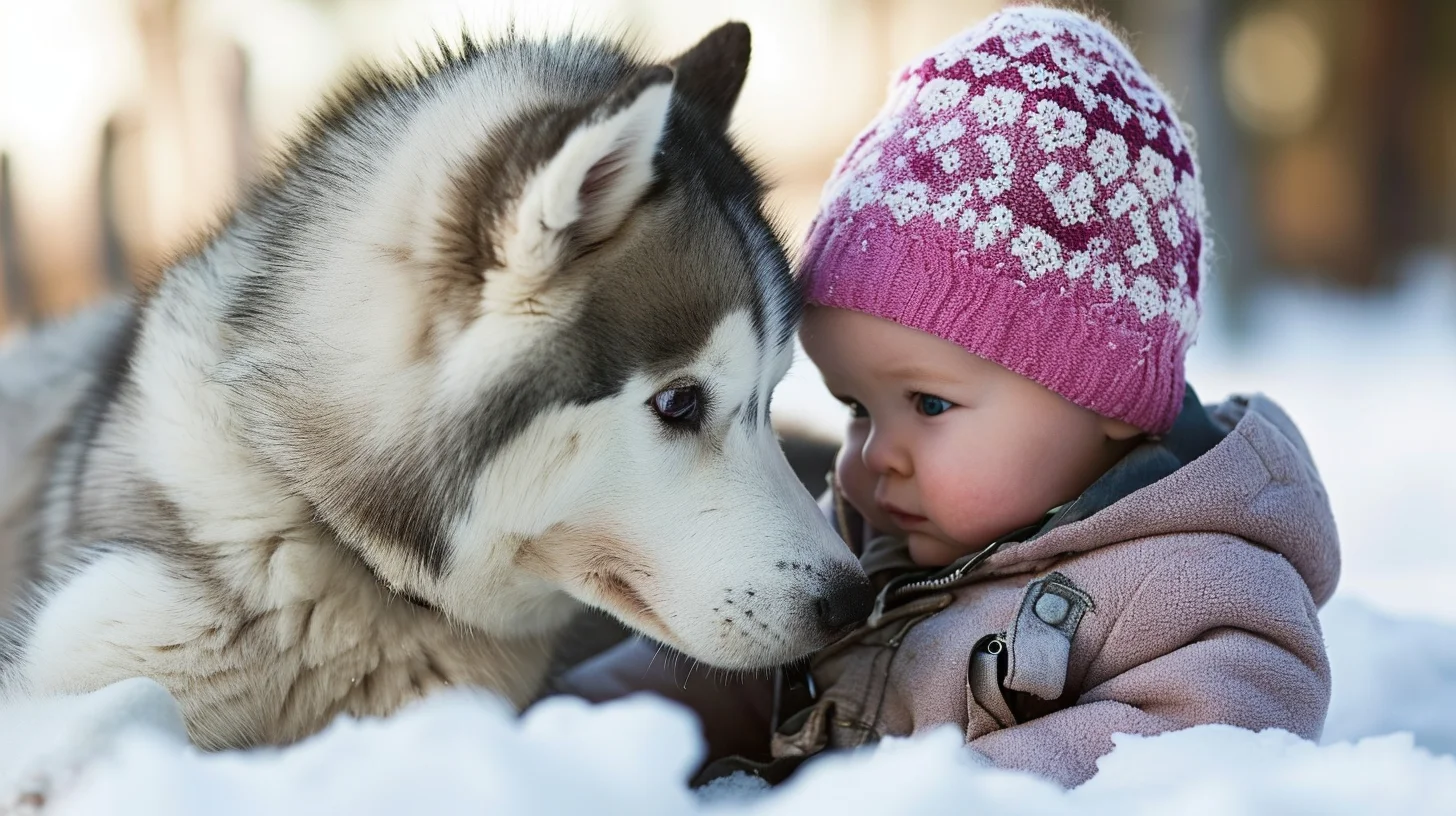Are you curious about the largest possible weight a husky can reach? In this comprehensive guide, we will delve into the world of husky weights and provide all the information you need to know.
Key Takeaways:
- Siberian Huskies reach their maximum height and weight at around 1.5 years old.
- Adult male Siberian Huskies weigh about 45-60 pounds and stand 22-24 inches tall on average.
- Adult females weigh about 35-50 pounds and stand 20-22 inches tall.
- Siberian Husky puppies can weigh around 2-5 pounds at birth.
- Factors like food intake, activity level, and overall health can influence a husky’s size.
Understanding Husky Weight Ranges
Adult Siberian Huskies have an average weight range of 45-60 pounds for males and 35-50 pounds for females, with heights averaging 22-24 inches for males and 20-22 inches for females. These weight and height ranges are considered typical for fully grown adult huskies.
However, it’s important to note that individual huskies may vary in size within these ranges due to factors like genetics, diet, exercise, and overall health. Some huskies may naturally be larger or smaller than the average, and this can also depend on their specific lineage or bloodline.
When considering the size of a husky, it’s essential to focus on their overall well-being rather than solely their weight. A healthy husky should have good muscle tone, energy levels, and a well-proportioned body. Monitoring their weight and size should be done in conjunction with regular veterinary check-ups and consultation with professionals who can provide guidance on maintaining their ideal weight.
Factors Affecting Husky Weight
A husky’s weight can be influenced by a combination of factors such as genetics, food intake, exercise level, and overall health. Maintaining an ideal weight is crucial for the well-being of your husky, and following weight management guidelines can help ensure their health and happiness.
Genetics: Just like humans, huskies inherit certain traits from their parents, including their size and build. Some husky breeds are naturally heavier and larger than others. If you have a husky with heavy breed genes, they may tend to be bigger and require closer monitoring of their weight.
Food Intake: What your husky eats plays a significant role in their weight. Providing a balanced diet that meets their nutritional needs without overfeeding is essential. Consult with your veterinarian to determine the appropriate portion sizes and the best diet for your husky’s specific needs.
| Food Intake Guidelines for Huskies | Weight Management Tips |
|---|---|
| Feed your husky high-quality dog food that is appropriate for their age and activity level. | Monitor your husky’s weight regularly to ensure they are within the recommended range. Adjust food portions accordingly. |
| Avoid feeding them table scraps or high-calorie treats as it can lead to weight gain. | Incorporate regular exercise into your husky’s routine to help them maintain a healthy weight. |
Exercise Level: Regular exercise is crucial for a husky’s physical and mental well-being. Engaging them in activities like daily walks, runs, or playtime can help them burn calories and maintain their weight. It is important to remember that every husky is different, and their exercise needs may vary based on their age, health condition, and energy level.
Overall Health: Ensuring your husky’s overall health is in prime condition can contribute to their weight management. Regular veterinary check-ups, vaccinations, and preventive care can help identify and address any underlying health issues that may impact their weight. Conditions such as hypothyroidism and metabolic disorders can cause weight gain in huskies and require proper diagnosis and treatment.
Conclusion
Understanding the factors that can influence your husky’s weight is essential for their overall well-being. By considering genetics, food intake, exercise level, and overall health, you can effectively manage your husky’s weight and help them lead a healthy and happy life.
Monitoring Husky Growth and Development
From birth to adulthood, it is essential to monitor your husky’s growth and development to ensure they are maintaining a healthy weight. Weight charts can be a useful tool to track their progress and identify any potential issues.
As Siberian Huskies grow, their weight will naturally increase. However, it’s important to keep an eye on their weight to prevent them from becoming overweight or underweight. Maintaining a healthy weight is crucial for their overall well-being and can help prevent potential health problems.
A Husky weight chart provides a visual representation of their growth trajectory. It allows you to compare your dog’s weight to the average weight for their age and breed. This can help you determine if your husky is on track or if there are any concerns that need to be addressed. Regularly measuring your husky’s weight and recording it on a weight chart can also help you identify patterns and trends over time.
Here is an example of a Husky weight chart:
| Age (in months) | Male Weight Range (in pounds) | Female Weight Range (in pounds) |
|---|---|---|
| 1 | 8-15 | 7-12 |
| 3 | 20-30 | 17-27 |
| 6 | 30-45 | 26-40 |
| 12 | 45-60 | 35-50 |
| 18 | 45-60 (fully grown) | 35-50 (fully grown) |
Remember that every husky is unique and may not fit precisely into these weight ranges. However, they can serve as a helpful guideline to ensure your husky is growing within a healthy range.
Factors Influencing Husky Size
Paw size and genetics can provide clues about how big a husky will grow, but it’s important to remember that maintaining an ideal weight and providing proper healthcare are crucial to prevent health issues associated with weight in huskies. While genetics play a role in determining a husky’s potential size, it is important to note that a husky’s weight should be within a healthy range to avoid problems such as joint issues and obesity-related diseases.
Proper nutrition and regular exercise are essential for maintaining an ideal weight. A balanced diet that meets a husky’s nutritional needs is key to keeping them healthy and preventing weight-related problems. It’s important to choose high-quality dog food that is appropriate for their age, size, and activity level. Additionally, portion control is vital to prevent overfeeding.
Exercise is another important factor in maintaining a husky’s weight. Regular physical activity helps keep them fit and prevents excessive weight gain. Daily walks, playtime, and mental stimulation through activities like puzzle toys are all beneficial for a husky’s overall well-being.
Regular veterinary check-ups are crucial to monitor a husky’s weight and overall health. A veterinarian can provide guidance on ideal weight guidelines for your husky based on their age, breed, and body condition. They can also address any concerns and suggest appropriate dietary adjustments or exercise routines if necessary.
| Factors Influencing Husky Size | Summary |
|---|---|
| Genetics | Provides clues about potential size |
| Paw Size | Can indicate potential size |
| Ideal Weight | Crucial for preventing health issues |
| Proper Healthcare | Regular check-ups, balanced diet, and exercise |
Health Issues in Huskies
While huskies are generally a healthy breed, they are prone to certain health issues such as cataracts, cancer, glaucoma, and zinc-responsive dermatosis. Regular veterinary check-ups and proper care are essential to address these potential health concerns.
Cataracts, a clouding of the lenses in the eyes, can affect huskies and cause vision impairment or blindness if left untreated. Regular eye exams can help detect cataracts early, allowing for timely intervention and management.
Huskies are also predisposed to certain types of cancer, including lymphoma and hemangiosarcoma. It is crucial to be vigilant for any signs of abnormal growths or changes in behavior and consult a veterinarian promptly for diagnosis and treatment options.
Glaucoma, a condition characterized by increased pressure within the eye, can occur in huskies and lead to vision loss if not managed timely. Annual eye exams and monitoring of intraocular pressure are vital in detecting and managing glaucoma in huskies.
| Health Issues | Description |
|---|---|
| Cataracts | Clouding of the lenses in the eyes, causing vision impairment. |
| Cancer | Various types of cancer, including lymphoma and hemangiosarcoma. |
| Glaucoma | Increased pressure within the eye, leading to vision loss. |
| Zinc-Responsive Dermatosis | A skin condition resulting from zinc deficiency. |
Zinc-responsive dermatosis is another condition seen in huskies, where a deficiency in zinc can lead to skin problems such as hair loss, scaly patches, and infections. A balanced diet with adequate zinc supplementation, under the guidance of a veterinarian, can help prevent and manage this dermatosis.
Overall, proactive veterinary care, regular check-ups, and a balanced diet are essential in maintaining the health and well-being of huskies. By being aware of these potential health issues and taking appropriate measures, you can ensure that your husky leads a healthy and happy life.
Growth and Maturity in Huskies
Huskies typically stop growing and reach their full size at around 18 months, with females maturing earlier than males. During this growth period, it is crucial to maintain a healthy weight to support their development and overall well-being. Proper nutrition and regular exercise play a vital role in ensuring that your husky grows into a strong and healthy adult.
One way to monitor your husky’s growth is by keeping track of their weight using weight charts. These charts provide a visual representation of their growth progress and can help you identify any potential issues or fluctuations in their weight. By following the recommended weight guidelines for huskies, you can ensure that your furry friend is on the right track and not under or overweight.
Paw size and genetics can also provide indicators of how big a husky will get. Larger paws often indicate that the husky will have a larger frame as an adult. However, it’s important to remember that every husky is unique, and there can be variations in size even among dogs from the same litter. Regardless of their expected size, maintaining a healthy weight is essential for their overall health and well-being.
| Husky Weight Range | Male (lbs) | Female (lbs) |
|---|---|---|
| Minimum | 45 | 35 |
| Average | 45-60 | 35-50 |
| Maximum | 60 | 50 |
While it’s important to ensure that your husky maintains a healthy weight during their growth period, it’s equally important to continue monitoring their weight and adjusting their diet as they reach adulthood. Just like humans, some huskies may have a tendency to gain weight more easily than others. Regular exercise, portion control, and a balanced diet can help maintain their weight and prevent obesity-related health issues in the long run.
Remember, maintaining a healthy weight is not just about appearance, but also about ensuring the overall well-being and longevity of your beloved husky. By providing them with proper care, nutrition, and exercise, you can help them grow into happy and healthy companions.
Summary of Husky Weight Management
Managing your husky’s weight is an essential aspect of their overall health and happiness. By following the guidelines discussed in this guide, you can ensure your husky maintains an ideal weight and enjoys a long, active life.
First and foremost, it’s important to be aware of the average weight range for adult Siberian Huskies. Adult males generally weigh between 45-60 pounds and stand 22-24 inches tall, while adult females weigh between 35-50 pounds and stand 20-22 inches tall. Keep in mind that these are just averages, and individual huskies may fall outside of these ranges. Regular monitoring of your husky’s weight using weight charts can help you keep track of their growth and ensure they stay within a healthy range.
Factors such as genetics, food intake, exercise level, and overall health can all influence a husky’s weight. It’s important to provide a balanced and nutritious diet to prevent excessive weight gain or loss. Regular exercise and physical activity are also crucial for maintaining a healthy weight and keeping your husky in top shape. Consult with your veterinarian to determine the ideal weight range for your husky and receive personalized guidance on their specific needs.
In addition to weight management, it’s essential to be mindful of potential health issues that huskies may be prone to. Regular veterinary check-ups and proper care are necessary to prevent and address these conditions. Some common health issues in huskies include cataracts, cancer, glaucoma, and zinc-responsive dermatosis. By staying proactive and providing proper healthcare, you can help your husky lead a happy and healthy life.
Summary:
- Monitor your husky’s weight using weight charts to ensure they stay within a healthy range.
- Consider factors such as genetics, diet, exercise, and overall health in managing your husky’s weight.
- Consult with your veterinarian for personalized guidance on your husky’s ideal weight range and specific needs.
- Stay proactive in preventing and addressing potential health issues that huskies may be prone to.
| Weight Range | Height Range |
|---|---|
| Adult Males: 45-60 pounds | Adult Males: 22-24 inches |
| Adult Females: 35-50 pounds | Adult Females: 20-22 inches |
Conclusion
In conclusion, understanding and managing your husky’s weight is crucial for their overall well-being. By following the information and guidelines provided in this guide, you can ensure your husky maintains a healthy weight and lives their best life. Siberian Huskies are medium-sized dogs that reach their maximum height and weight at around 1.5 years old. Adult male Siberian Huskies weigh about 45-60 pounds and stand 22-24 inches tall on average, while adult females weigh about 35-50 pounds and stand 20-22 inches tall.
Siberian Husky puppies can weigh around 2-5 pounds at birth, and their size is influenced by factors like food intake, activity level, and overall health. It is important to monitor a Husky’s growth using weight charts and ensure they maintain a healthy weight. Siberian Huskies stop growing at around 18 months, with females maturing earlier than males. Paw size and genetics can provide indicators of how big a Husky will get.
Proper healthcare is essential for Siberian Huskies as they are prone to certain health issues such as cataracts, cancer, glaucoma, and zinc-responsive dermatosis. Regular veterinary check-ups and a well-balanced diet are key in preventing and managing these conditions. By providing your husky with the necessary care and attention, you can help them lead a happy and healthy life.
Remember, maintaining an ideal weight for your husky is not only important for their physical health but also their mental well-being. A healthy weight ensures proper joint and muscle function, reduces the risk of obesity-related diseases, and promotes overall longevity. By incorporating exercise, portion control, and regular monitoring into your husky’s routine, you can keep them at their optimal weight and ensure they thrive.
Can Husky Health Problems Affect Their Weight?
Yes, the most common husky health problems can indeed affect their weight. Issues such as hypothyroidism, cataracts, and hip dysplasia can all impact a husky’s weight and overall well-being. It’s important to monitor their health closely and consult with a vet if any concerns arise.
FAQ
Q: How much do adult Siberian Huskies weigh?
A: Adult male Siberian Huskies weigh about 45-60 pounds, while adult females weigh about 35-50 pounds.
Q: How tall are adult Siberian Huskies?
A: Adult male Siberian Huskies stand 22-24 inches tall on average, while adult females stand 20-22 inches tall.
Q: How much do Siberian Husky puppies weigh at birth?
A: Siberian Husky puppies can weigh around 2-5 pounds at birth.
Q: What factors influence a Husky’s size?
A: A Husky’s size can be influenced by factors like genetics, food intake, activity level, and overall health.
Q: When do Siberian Huskies stop growing?
A: Siberian Huskies stop growing at around 18 months, with females maturing earlier than males.
Q: Can paw size indicate how big a Husky will get?
A: Yes, paw size and genetics can provide indicators of how big a Husky will get.
Q: What health issues are Siberian Huskies prone to?
A: Siberian Huskies are prone to certain health issues such as cataracts, cancer, glaucoma, and zinc-responsive dermatosis.




